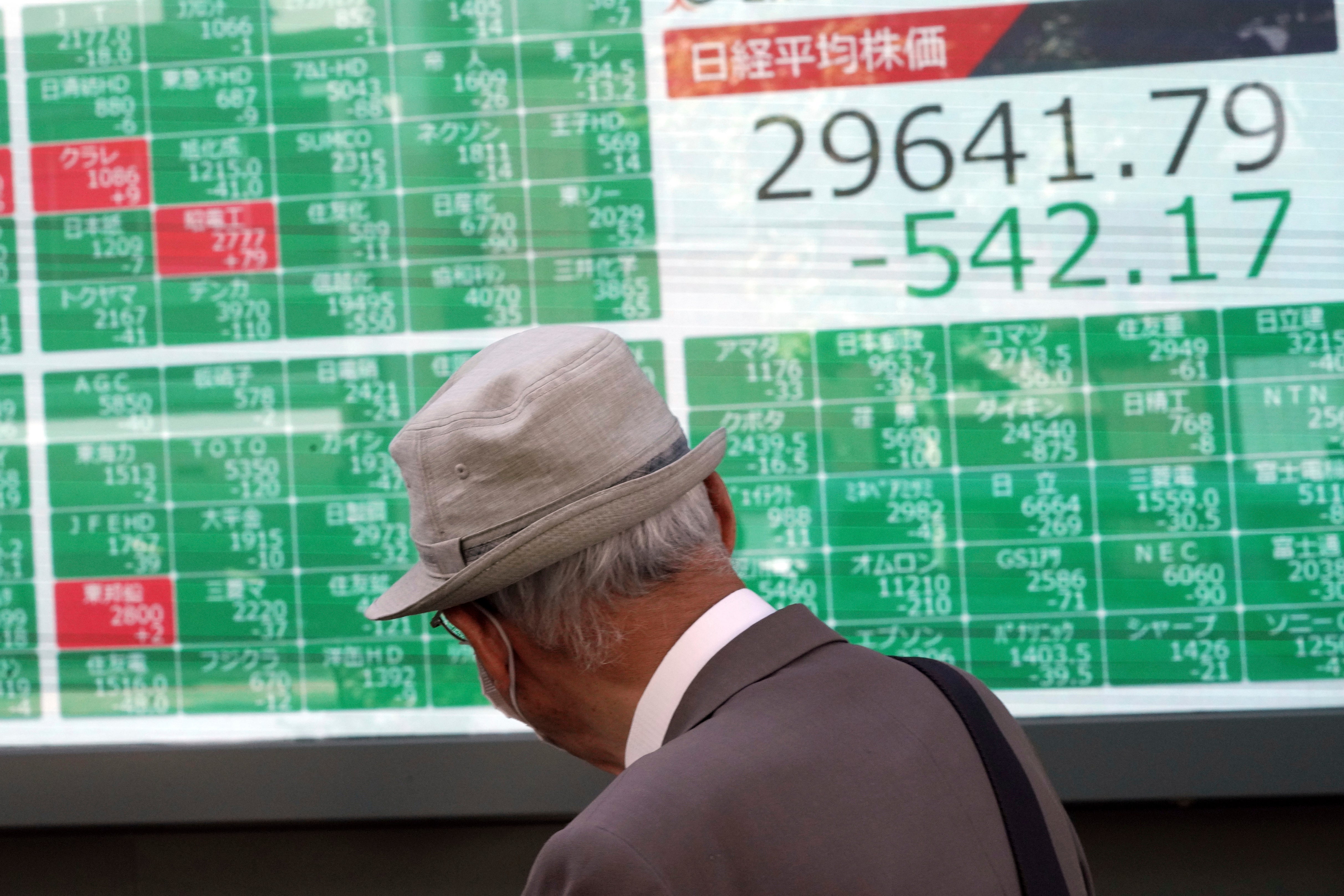Asian shares tumble on jitters over inflation, bond yields
Asian shares have fallen sharply after a broad slide on Wall Street as investors grew jittery over rising prices and a surge in U.S. government bond yields

Your support helps us to tell the story
From reproductive rights to climate change to Big Tech, The Independent is on the ground when the story is developing. Whether it's investigating the financials of Elon Musk's pro-Trump PAC or producing our latest documentary, 'The A Word', which shines a light on the American women fighting for reproductive rights, we know how important it is to parse out the facts from the messaging.
At such a critical moment in US history, we need reporters on the ground. Your donation allows us to keep sending journalists to speak to both sides of the story.
The Independent is trusted by Americans across the entire political spectrum. And unlike many other quality news outlets, we choose not to lock Americans out of our reporting and analysis with paywalls. We believe quality journalism should be available to everyone, paid for by those who can afford it.
Your support makes all the difference.Asian shares fell sharply on Wednesday after a broad slide on Wall Street as investors reacted to a surge in U.S. government bond yields.
Tokyo's Nikkei 225 sank 2.1% to 29,544.29 and the Kospi in Seoul dropped 1.2% to 3,062.18. The Shanghai Composite index shed 1.6% to 3,544.07. In Sydney, the S&P/ASX 200 gave up 1.4% to 7,174.20.
Hong Kong s Hang Seng index reversed earlier losses, gaining 0.6% to 24,639.86 after troubled property developer Evergrande Group said it was selling a stake in Shengjing Bank for 9.9 billion yuan ($1.5 billion) — a step toward addressing its cash crunch.
Evergrande's Hong Kong-traded shares jumped 10.9%.
In Japan, the choice by the ruling Liberal Democrats of Former Foreign Minister Fumio Kishida to head the party and thus become the next prime minister came after markets had closed.
Kishida, 64, is seen as an establishment figure, though he has called for measures to address growing inequality in Japan, the world's third largest economy.
A swift rise in Treasury yields is forcing investors to reassess whether prices have run too high for stocks, particularly the most popular ones. On Tuesday, the yield on the 10-year Treasury jumped to 1.54%, its highest level since late June. That’s up from 1.32% a week ago.
Early Wednesday, it was steady at 1.53%.
“What we got here is stock market that finally looks vulnerable as Treasury yields surge, oil prices look like they could easily hit $90 a barrel, and as supply chain issues show no signs of easing," Edward Moya of Oanda said in a commentary.
On Tuesday, the benchmark S&P 500 index fell 2%, its worst drop since May, and the tech-heavy Nasdaq fell 2.8%, its worst drop since March. Decliners outnumbered advancers on the New York Stock Exchange 4 to 1.
The benchmark S&P 500 is down 3.8% so far this month and on pace for its first monthly loss since January after it gained nearly 16% since the beginning of 2021.
Bond yields started rising last week after the Federal Reserve sent the clearest signals yet that the central bank is moving closer to begin withdrawing the unprecedented support it has provided for the economy throughout the pandemic. The Fed indicated it may start raising its benchmark interest rate sometime next year and will likely begin cutting back the pace of its monthly bond purchases before the end of this year.
A rise in yields means Treasurys are paying more in interest, and that gives investors less incentive to pay high prices for stocks and other things that are riskier bets than super-safe U.S. government bonds. The recent upturn in rates has hit tech stocks particularly hard because their prices look more expensive than much of the rest of the market, relative to how much profit they’re making.
The S&P 500 fell 90.48 points to 4,352.63. The Dow Jones Industrial Average lost 1.6%, to 34,299.99.
Small company stocks also lost ground. The Russell 2000 index dropped 2.2%, to 2,229.78.
Chipmaker Nvidia fell 4.4%, Apple slid 2.4% and Microsoft fell 3.6%. The broader technology sector is also contending with a global chip and parts shortage because of the virus pandemic. That could worsen as factories in some parts of China are idled by power shortages.
Companies are warning that supply chain problems and higher prices could crimp sales and profits. The Federal Reserve has maintained that rising inflation is temporary and tied to those supply chain disruptions as the economy recovers from the pandemic.
In other trading, U.S. benchmark crude oil gave up $1.29 to $74.00 per barrel in electronic trading on the New York Mercantile Exchange. It lost 16 cents to $75.29 per barrel on Tuesday.
Brent crude oil, the standard for international pricing, declined $1.28 to $77.07 per barrel.
The U.S. dollar slipped to 111.42 Japanese yen from 111.48 yen. The euro was little changed, at $1.1682.